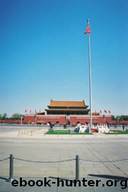China's Three Gorges, Xi'an & the Terracotta Warriors by Simon Foster

Author:Simon Foster [Foster, Simon]
Language: eng
Format: epub
Publisher: Hunter Publishing, Inc.
Published: 2010-10-28T00:00:00+00:00
Practicalities
Money Matters
The Currency
The currency of China is the yuan ($), also known as the kwai or renminbi (RMB), which literally translates as "people's money.â At the time of writing there were $8to the US dollar, $10 to the Euro and $16 to the British Pound Sterling. Paper money was introduced to the world by China in 806 AD and today bank notes come in various amounts, many of which show a portrait of the omnipresent Chairman Mao on the front and famous landscapes from around the country on the back. Denominations are $100 (red), $50 (green), $20 (brown), $10 (blue), $5 (purple or brown), $2 (green) and $1 (green or brown), along with the almost worthless 5, 2 and 1 mao notes (10 mao, also referred to as jiao = $1). The $2 and 2 mao notes are both green and look very similar â remember the lower value one is the smaller of the two. Counterfeiting is rife in China and even the smallest local store may have a UV scanner. While $10 notes are often copied, the one to watch out for is the $100 (see Warning â Scams). The quality of fakes is often high, but generally you can tell by the feel of the money, which is often a little too crunchy to the touch. In Hong Kong the currency is the Hong Kong dollar (HK$) and at the time of writing there were HK$8 to the US$, HK$10 to the Euro and HK$15 to the British Pound Sterling. In Macau the pataca, or Macau dollar (MOP$) is roughly equivalent to the HK$, which can be used throughout the territory.
Banks & Foreign Exchange
The Bank of China (not the Agricultural Bank of China, Construction Bank of China, Industrial Bank of China or any of the other similarly named institutions) is the only bank licensed to exchange foreign currency or travelers' checks. Their opening hours may vary but are generally Monday to Friday from 9 am-noon and 2-5 pm. Upscale hotels can also change money, although their rates tend to be a little worse.
In order to change money you'll need your passport and, often, a sense of patience, as each one of your crisp greenbacks or checks is meticulously inspected. Dollars are by far the most readily accepted exchange currency, followed by Euros and then Pounds Sterling. When China first opened its doors to tourism in the 1980s, foreigners had to use FECs (Foreign Exchange Certificates), which led to the development of blackmarket money changing. Now that tourists use yuan like everybody else, blackmarket money changers are rare â if you are approached with rates that sound too good to be true, steer clear as there will probably be a few fake bills among your wad. Note that you can't change Chinese yuan into other currencies outside of China so budget accordingly and spend all of your cash!
Unlike Mainland China, Hong Kong is overflowing with exchange booths and it's quick and easy to change money. Some of the best rates are generally found on the ground floor of Chungking Mansions on Nathan Road in Kowloon.
Download
This site does not store any files on its server. We only index and link to content provided by other sites. Please contact the content providers to delete copyright contents if any and email us, we'll remove relevant links or contents immediately.
China Rich Girlfriend by Kwan Kevin(3902)
The Silk Roads by Peter Frankopan(3772)
Annapurna by Maurice Herzog(2845)
Hot Thai Kitchen by Pailin Chongchitnant(2815)
Full Circle by Michael Palin(2780)
Okonomiyaki: Japanese Comfort Food by Saito Yoshio(2391)
City of Djinns: a year in Delhi by William Dalrymple(2138)
The Ogre by Doug Scott(2118)
Photographic Guide to the Birds of Indonesia by Strange Morten;(2091)
Tokyo by Rob Goss(2022)
Vietnam, Cambodia, Laos & Northern Thailand by Lonely Planet(2016)
Tokyo Geek's Guide: Manga, Anime, Gaming, Cosplay, Toys, Idols & More - The Ultimate Guide to Japan's Otaku Culture by Simone Gianni(1949)
Discover China Travel Guide by Lonely Planet(1868)
Everest the Cruel Way by Joe Tasker(1829)
China (Lonely Planet, 11th Edition)(1800)
Lonely Planet China(1758)
China Travel Guide by Lonely Planet(1741)
Top 10 Dubai and Abu Dhabi by DK Travel(1719)
Iranian Rappers And Persian Porn by Maslin Jamie(1713)
